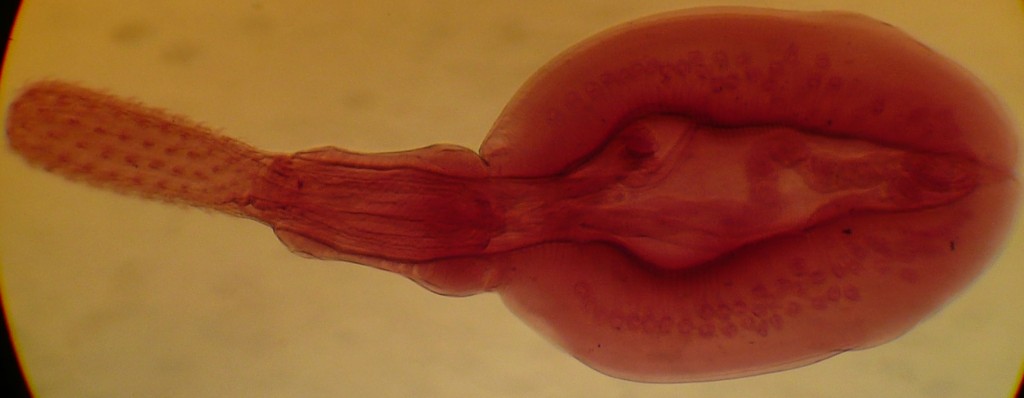Originally posted May 17, 2009.
Acanthocephalan parasites are infamous for their ability to dramatically alter the behavior of their hosts. These parasites often have multi-stage life cycles, meaning that they die unless the host that they’re currently residing in gets eaten by the next host in the cycle. Acanthocephalans are remarkably efficient at manipulating their intermediate hosts into ending up on the dinner plate of the next host in the cycle.
One well-known example of this manipulation involves the acanthocephalan parasitePolymorphus minutus and its crustacean intermediate host Gammarus roeseli. The definitive host of P. minutus is a waterbird which scoops G. roeseli out of the water. The usually defense by G. roeseli to avoid being consumed by the waterbird is to hunker down at the bottom of a streambed and hide in the rubble. The parasite is capable of counteracting this defensive mechanism, presumably by altering the concentration of serotonin in the crustacean’s nervous system. This manipulation causes the the host to swim to the water surface and clamp down on the surrounding vegetation. In a closely related system (a different species of Gammarus and a different Polymorphus parasite), this behavior has been found to significantly increase consumption of infected gammarids by waterbirds. In essence, the parasite causes its tiny host to swim up to where the predators are feasting and hang out until it becomes dinner.
The interests of G. roeseli and the parasite P. minutus are clearly not aligned when it comes to waterbird predation. There is, however, one thing that they can agree on. Neither of them want to end up in the stomach of other predators (fishes, crustaceans, etc.). Non-waterbird predators represent a dead end for both members of the party. The old addage “the enemy of my enemy is my friend” goes a long way here, and recent studies suggest that the parasite enhances the host’s ability to stay out of harm’s way when their interests converge.
Medoc et al. 2009 have shown that gammarids infected with P. minutus have a leg up on their uninfected counterparts when it comes to avoiding predation by three-spined sticklebacks. Infected gammarids spent more time hiding in vegetation near the water surface and suffered much lower predation rates. Additionally, another recent study found that infected gammarids are up to 35% faster when escaping a predatory crustacean.
This phenomenon has received little attention in the literature. The few studies that have looked at whether or not parasites “help” their hosts escape from mutually unfavorable predators have reported mixed results. Some studies have found that infection increased the host’s susceptibility to all predators, whether or not they’re included in the parasite’s life cycle.
The two studies decribed above showed that the gammarids could escape from predators if escape involved moving fast or hiding near the water surface. But, although the parasites have evolved an excellent host manipulation, it’s probably not perfect.
For example, in the above system where parasites make gammarids cling to water surface vegetation in order to be eaten by birds, it is likely that by doing so the gammarids become vulnerable to other predators. At that water level, there should be a number of other predators that can take advantage of the defenseless gammarids. How fine-tuned the parasite’s control of the gammarid can be is an interesting question deserving future study.




[…] The Enemy of My Enemy is My Friend […]
[…] This post was mentioned on Twitter by Bora Zivkovic, thaitvnews. thaitvnews said: RT @BoraZ: The Enemy of My Enemy is My Friend http://bit.ly/9sa5Ni […]
ha, I am going to experiment my thought, your post bring me some good ideas, it’s really amazing, thanks.
– Thomas
Literature is mostly about having sex and not much about having children. Life is the other way round.
The proverb is sometimes phrased as “the enemy of mine enemy is my friend” or “my enemy’s enemy is my friend.